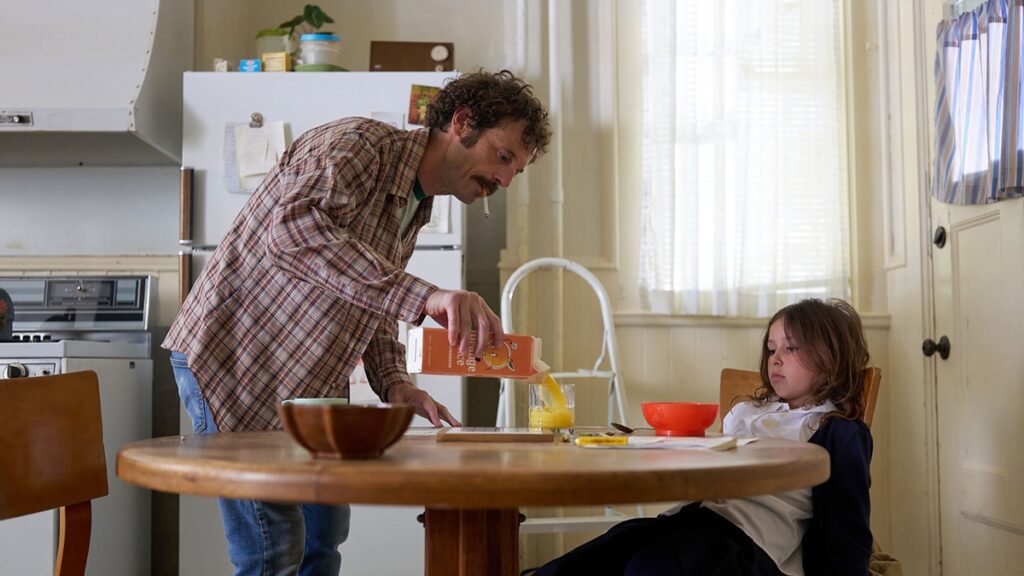Two tales of fathers and repression explore the importance of self-realization and the cost of parental absence.
In trying to represent marginalized communities accurately, we often see portrayals that treat marginalization as a point of exceptional virtue. There’s an implication that people who don’t live lives presented by dominant media as “normal” need overcompensation. This manifests itself as portrayals in an infallibly positive light. This tends to happen because there is still an inherent misunderstanding, especially in Hollywood, that being underprivileged or underrepresented is something to overcome through fictional media and not through things like policy, legislation, and freedom.
Andrew Durham’s Fairyland provides a refreshing contrast to this typical presentation. It showcases its foremost gay character as a free-spirited individual who values the ability to express his lifestyle AND a frequently inadequate, often neglectful, and ultimately regretful father.

Based on the memoir by Alysia Abbot, Fairyland tends to play it safe with its by-the-years approach to adaptation. Steve Abbot (Scoot McNairy), a struggling writer, moves to San Francisco with his daughter Alysia (Emilia Jones) after his wife passes away in a car crash. Radios and televisions throughout the film crackle with clips and news briefings of Harvey Milk’s impending election, the rise of Anita Bryant as a vehement anti-gay voice, and the passing and rejection of several legislative reforms. Durham’s direction takes a pronounced nostalgic angle. Point-of-view shots of Alysia’s perspective and the transition from film grain to smooth digital chart the passage of time.
However, a refreshingly prickly nature belies this film’s sun-dipped, dewy-eyed visual pallet. The movie turns its father-daughter relationship into a mirror of America’s own ongoing fraught process of accepting LGBTQIA equality. As Jessica grows older, her resentment over her father’s neglect manifests dangerously as homophobia, driving her to spew the f-slur, seemingly out of pure exhaustion, in one scene.
[A] refreshingly prickly nature belies this film’s sun-dipped, dewy-eyed visual pallet.
Conversely, in a confessional moment with Alysia, Steve traces his shortcomings as a father to the judgment and danger society posed to him. He links his sexual promiscuity at an older age and parental neglect to the inability to express his full self as a youth. It’s a moment of honesty signaling that captures how discrimination creates a cascading effect. It carves a fallout zone that affects the victims for years after, as well as others in their lives.
The tragedy that befalls the central family in Saim Sadiq’s striking and defiantly honest Joyland is a manifestation of communal embarrassments and the phantom of traditional bigotries dormant but not extinguished. While this movie doesn’t trace its country’s history through a queer story as Fairyland does, it shares that film’s thesis of familial neglect as collateral damage stemming from an inability to express one’s true self.

Judged by the traditional standards of his society, Haider (Ali Junejo) would be labeled an emasculated man. He makes less than his wife Fayyaz (Sania Saeed). Additionally, he presents as less driven by desire and ambition than her. However, he finds a backbone through employment at a theater company. There he develops a friendship with a trans dancer named Biba (Alina Khan). When another woman verbally accosts Biba on the train, we see Haider assert himself for the first time. He expresses his ideals openly, sitting between them to present a protective barrier for his friend. His newfound friendship/romance comes at the expense of his stable marriage with a caring wife. Meanwhile, the rest of the family doesn’t even know the full extent of his new job.
Sadiq’s movie is one of hushed whispers, both accepting and malicious. Speaking out of turn, talking about emotions, and challenging traditional roles in the family are themes sublimated and begging for release. The camera scans the solemn faces of Haider’s family whenever anyone discusses the idea of breaking norms. Each character looks to the others as if in hope and fear that they will say something. For instance, when Haider’s widowed neighbor becomes a little too friendly with his stern father (Salmaan Peer), sparking a confrontation. Unfortunately, everyone is too afraid to speak. Only the widow is willing, and she’s actively discouraged from doing so.
Sadiq’s movie is one of hushed whispers, both accepting and malicious.
Fairyland has familial acceptance and embrace of queer people mirrored in the slow progress of the nation’s policies through the decades. In contrast, Joyland presents a country at a standstill. Pakistan likely won’t remain the same forever. Nothing ever does. Still, the movie is heavy with the feeling that it might. Progress or acceptance only occurs behind closed doors, if at all. Most keep their thoughts and feelings that run counter to tradition bottled up inside, hidden from nearly everyone else.
Both these films consider the value of safe spaces for their characters, places safely shielded from society. However, they also reckon with how the central male figures’ quest for those spaces creates an absence in their families. As a result, they’re framed as flawed and ultimately tragic figures.
Read next: The Spool's Best New Releases
Streaming guides
The Best Live TV Streaming Services With Free Trial
The praises of live TV streaming services don’t need to be further sung. By now, we all know that compared to clunky, commitment-heavy cable, live TV is cheaper and much easier to manage. But just in case you’re still on the fence about jumping over to the other side, or if you’re just unhappy with ... The Best Live TV Streaming Services With Free Trial
How to Watch Power Book III: Raising Kanan Season 3
Season 3 of the hotly anticipated Power spin-off, Power Book III: Raising Kanan, is arriving on Starz soon, so you know what that means: it’s the ’90s again in The Southside, and we’re back with the Thomas family as they navigate the ins and outs of the criminal underworld they’re helping build. Mekai Curtis is ... How to Watch Power Book III: Raising Kanan Season 3
How to Watch Doctor Who: 60th Anniversary Specials
Ladies and gentlemen, we’re so back! To celebrate Doctor Who’s 60th anniversary, the BBC is producing a three-episode special starring none other than the Tenth/Fourteenth Doctor himself, David Tennant. And to the supreme delight of fans (that would be me, dear reader), the Doctor will be joined by old-time companion Donna Noble (Catherine Tate) and ... How to Watch Doctor Who: 60th Anniversary Specials
Which Netflix Country has Interstellar?
Maybe you’ve just seen Oppenheimer and have the strongest urge to marathon—or more fun yet, rank!—all of Christopher Nolan’s films. Or maybe you’re one of the few who haven’t seen Interstellar yet. If you are, then you should change that immediately; the dystopian epic is one of Nolan’s best, and with that incredible twist in ... Which Netflix Country has Interstellar?
Which Netflix Country Has Each Movie of The Hunger Games?
For whatever reason, The Hunger Games series isn’t available in the same countries around the world. You’ll find the first and second (aka the best) installments in Hong Kong, for instance, but not the third and fourth. It’s a frustrating dilemma, especially if you don’t even have a single entry in your region, which is ... Which Netflix Country Has Each Movie of The Hunger Games?
How to Watch ESPN With A Free Trial
One of the major concerns people have before cutting the cord is potentially losing access to live sports. But the great thing about live TV streaming services is that you never lose that access. Minus the contracts and complications of cable, these streaming services connect you to a host of live channels, including ESPN. So ... How to Watch ESPN With A Free Trial
How to Watch Paramount Network With a Free Trial
To date, Paramount Network has only two original shows on air right now: Yellowstone and Bar Rescue. The network seems to have its hands full with on-demand streaming service Paramount+, which is constantly stacked with a fresh supply of new shows. But Yellowstone and Bar Rescue are so sturdy and expansive that the network doesn’t ... How to Watch Paramount Network With a Free Trial
How to Watch WE TV With a Free Trial
Previously “Women’s Entertainment,” We TV has since rebranded to accurately reflect its name and be a more inclusive lifestyle channel. It’s home to addictive reality gems like Bold and Bougie, Bridezillas, Marriage Boot Camp, and The Untold Stories of Hip Hop. And when it’s not airing original titles, it has on syndicated shows like 9-1-1, ... How to Watch WE TV With a Free Trial
How to Watch TNT Sports With A Free Trial
For many sports fans, TNT is a non-negotiable. It broadcasts NBA, MLB, NHL, college basketball, and All Elite Wrestling matches. And, as a bonus, it also has reruns of shows like Supernatural, Charmed, and NCIS, as well as films like The Avengers, Dune, and Justice League. But while TNT used to be a cable staple, ... How to Watch TNT Sports With A Free Trial
How to Watch Comedy Central With a Free Trial
It’s no coincidence that many of today’s biggest comedians found their footing on Comedy Central: the channel is a bastion of emerging comic talents. It served as a playground for people like Nathan Fielder (Fielder For You), Ilana Glazer and Abbi Jacobson (Broad City), Tim Robinson (Detroiters), and Dave Chappelle (Chappelle’s Show) before they shot ... How to Watch Comedy Central With a Free Trial
How to Watch FX With a Free Trial
You’d be hard-pressed to find a bad show airing on FX. The channel has made a name for itself as a bastion of high-brow TV, along with HBO and AMC. It’s produced shows like Atlanta, Fargo, The Americans, Archer, and more recently, Shogun. But because it’s owned by Disney, it still airs several blockbusters in ... How to Watch FX With a Free Trial